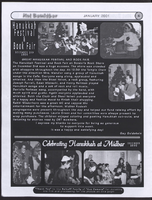Search the Special Collections and Archives Portal
Search Results
Kathy Eastland Papers
Identifier
Abstract
The Kathy Eastland Papers (1972-2003) document Kathy Eastland's experiences working in Nevada brothels. Materials include ephemera and memorabilia collected by Eastland from various brothels in Nevada such as the Mustang Ranch, the Moonlite BunnyRanch, and Old Bridge Ranch. Included in the collection are brothel menus and photographs of Eastland and other sex workers socializing in the brothels. The collection also contains notes, research, and drafts of Eastland's manuscript
Archival Collection
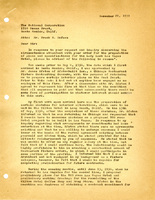
Letter from Homer Rissman to Frank S. Hofues, Santa Monica, December 21, 1955
Date
Archival Collection
Description
Five-page letter from Homer Rissman to Frank Hofues regarding the Lady Luck Casino, later named the Hacienda.
Text
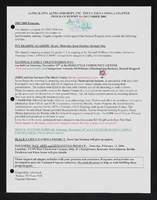
Alpha Kappa Alpha Sorority, Theta Theta Omega Chapter program committee reports
Date
Archival Collection
Description
From the Alpha Kappa Alpha Sorority, Incorporated, Theta Theta Omega Chapter Records (MS-01014) -- Chapter records file.
Text
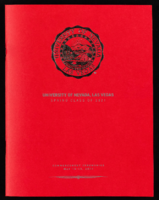
University of Nevada, Las Vegas (UNLV) Spring 2021 commencement program
Date
Archival Collection
Description
Commencement program from University of Nevada, Las Vegas Commencement Programs and Graduation Lists (UA-00115).
Text

Charles Lee Hank III oral history interview: transcript
Date
Archival Collection
Description
Oral history interview with Charles Lee Hank III conducted by Claytee D. White and Barbara Tabach on April 10, 2019 for the Remembering 1 October Oral History Project.
Charles Lee Hank III describes his experience with police growing up in Chicago and the dichotomy he feels now as a police officer for the Las Vegas Metropolitan Police Department (LV Metro). Hank discusses the events of the October 1 shooting at the Route 91 Festival, the chaotic experience he and other officers experienced as they looked for the shooter in the Mandalay Bay, and the aftermath as a member of the Las Vegas community and as an officer of LV Metro.
Subjects discussed include: Las Vegas Strip Area Command.
Text
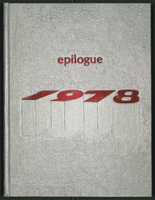
Epilogue: UNLV Yearbook, 1978
Date
Description
Yearbook main highlights: schools and departments; detailed lists with names and headshots of faculty, administration and students; variety of photos from activities, festivals, campus life, and buildings; campus organizations such as sororities, fraternities and councils; beauty contest winners; college sports and featured athletes; and printed advertisements of local businesses; Institution name: University of Nevada, Las Vegas
Mixed Content

Casiano Corpus Jr. oral history interview: transcript
Date
Archival Collection
Description
Oral history interview with Casiano Corpus Jr. conducted by Cecilia Winchell and Stefani Evans on February 14, 2023 for the Reflections: the Las Vegas Asian American and Pacific Islander Oral History Project. In this interview, Corpus Jr. details a difficult childhood in the Philippines, where society is highly socioeconomically stratified. He recalls his parents working a number of jobs to support their large family, and as soon as he finished his primary schooling, he also started working in construction. When his father was finally petitioned by his uncle to move to the United States, Corpus was at first reluctant to go, since he had a familiar life in the Philippines, but has come to love the United States and the life he created for himself. Immediately after moving to the United States, their family landed in Las Vegas, Nevada, and Corpus began working a number of jobs. He started out as a busboy at a Chinese restaurant before deciding that he wanted to work in a casino and moved to Union Plaza. His current job is as a porter at Palace Station, where he has been for the past 31 years. He has also been working to unionize Palace Station and Station casinos with the Culinary Union for the past twelve years. He talks about the hunger strike he organized, why he organizes with no fear, and what he hopes to see out of his efforts throughout the interview.
Text

Dr. Deborah Kuhls oral history interview: transcript
Date
Archival Collection
Description
Oral history interview with Dr. Deborah Kuhls conducted by Barbara Tabach on December 29, 2017 for the Remembering 1 October Oral History Project. In this interview, doctor Deborah A. Kuhls describes the preparation and procedures implemented at the University Medical Center of Southern Nevada (UMC) during the night of the October 1, 2017 mass shooting in Las Vegas, Nevada. She describes her experiences from that night and into the next morning, starting from when the trauma center first learned about the shooting to when patients began arriving. She goes into detail on the hospital's Military-Civilian Trauma System Partnership, which allowed for the installation of a second trauma area to treat the large volume of patients. In addition to the events at the hospital, Kuhls talks about the flurry of activities during the week of the shooting, including interviews with various media, the statewide meeting for surgeons, fellows, and residents where "stop the bleed" training was provided, and general meetings with various government officials, including Donald Trump. Deborah Kuhls also discusses the emotional impact of the shooting and its aftermath as well as her goals for the future of trauma in the medical field.
Text

